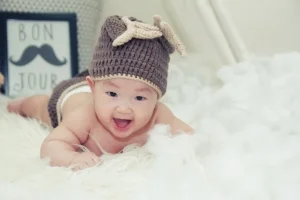Baby’s brains are pretty incredible. They are the best learners and they seemingly never stop trying to learn more about the world!
Here are some fun facts to celebrate the often unsung baby brain!
1. Babies can learn ANY language
Bonjour!
…that is any language that it hears. Babies are born with all the neurons they will ever need to detect sound patterns in speech. They are constantly making new connections between sounds they hear and the things they see and what they feel. This is the foundation of language which helps us make meaning of the world and communicate with each other. It isn’t until around 3 years old that the brain goes through a pruning process where the least used connections are pruned away in favour of the more frequently used connections (i.e. the language they hear the most of amongst many other experiences).
2. Babies can make more connections than adults
Babies are born with 100 billion brain cells (that is 10 times the number of stars in the milky way!)
That’s a lot of potential right there! By the time a child is 3 years old they will have formed about 1000 trillion connections (which is twice as many as adults have!). In this way you might say babies are more open minded than adults! There is a huge window of opportunity for learning in these first 3 years. The more frequent the connections are made in their environment, the more likely they are to stick. E.g. A baby who consistently & repeatedly hears their name and experiences the parent looking at them joyfully will have strong neural connections between the sound of their name & the associated attention & emotional sensations of joy!
3. Babies are programmed for connection
They search for faces. They learn about the world through your eyes, through your responses. Even beyond the toddler years, children will venture out in their play but keep looking back to see your response and to check that they are safe. We make sense of our world through relationships. If that relationship is a safe playful loving reliable relationship a child will grow up to feel that they are lovable, their needs will be met, they are safe and they can cope in the world.
“There is a huge window of opportunity in these first few years. Fun facts: #Baby Brain development @FCPlayTherapy”
4. Babies brains develop within a loving relationship
Image courtesy of http://childhoodtraumarecovery.com/2017/02/23/romanian-orphanage-study-early-life-neglect-damages-brain/
Sadly we know that in the absence of a regular consistent loving relationship, brain development suffers. Babies in a Romanian orphanage had all their physical needs met such as food, water, bathing and shelter. However the staff weren’t consistent because of a rota system and they had no time to play and connect with the babies so the children missed out on this special connection. The picture above shows the brain size differences between a typical child’s brain and a child who had been deprived of early loving relationship. Heartbreaking I’m sure you’ll agree :(
5. Babies build their brain like houses, from the bottom up!
Survival & safety are the foremost! It is important to lay good foundations of safety before expecting a baby to develop more complex cognitive skills such as language. How can you make an infant feel safe? An infant will feel safer when not only their basic needs of food, water and shelter are taken care of, but also their emotional needs. "Am I alone?”
"Am I lovable?" "Am I worth talking to?" "How do I need to be to get love and ensure my survival?" "What is going on inside me right now?" It takes an attuned caregiver to help co-regulate an infant's nervous system and help them experience themselves.
Easy Tips on how to support your baby's brain development!
If you want to give your baby a good foundation for their brain development there are some simple strategies that you can do.
- Sing, chat & talk to babies as much often. Respond to attempts to babble. They are learning about the sounds, the meaning and speech patterns. They are also learning that they are worthy of attention, connection and love!
- Practice attuning to your baby’s signals and reflecting back to them. The baby first learns about themselves through your eyes. Reflect back to babies with your facial expression, words or even just a sound like “oh!” when they seem uncomfortable.
For more strategies & more personalised guidance on attuning with baby join a Licensed Baby Bonding series of classes in your area.
If you’re in Hong Kong, you can join Full Cup Play Therapy’s baby bonding groups. Private home visits are also available, please enquire.
For those readers outside Hong Kong, Full Cup offers Baby bonding for pregnant moms over Skype. Please enquire through our contact page.
Refs: Brotherson, S. (2009). Understanding Brain Development in Young Children. Bright Beginnings #4, NDSU










